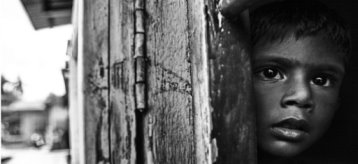"Why Myanmar's generals shun aid?"
By Larry Jagan, Myanmar analyst for Al Jazeera

The suffering caused by Cyclone Nargis seems far from the military's priorities [Reuters]
Bunkered away in the centre of the country, the secret and reclusive generals who rule
A week after a deadly cyclone and facing huge pressure to open their country to international aid, they see everyone as a potential enemy intent on overthrowing their rule.
Rather than alieviating the suffering wrought by Cyclone Nargis, the top generals' primary concern at present is to preserve their power and protect their families' future position and wealth.
Their outlook is solely shaped by military considerations, looking at the world through soldiers eyes. But their nationalist xenophobia also has its roots in the style and superstitions of General Ne Win, the country's first military dictator.
He seized power in a coup in 1962 and the military have ruled ever since.
Reclusive and eccentric, Ne Win shunned contact with the outside world, turning the country then known as
The first few years of his rule saw pogroms against the Chinese and Indian communities, forcing tens of thousands to flee the country. He also banned the teaching of English in the schools.
Fear
"
For years the generals' greatest fear has been that the
To prepare for that, they have built a rabbit-warren of bunkers around their new capital, Naypyidaw, in the hills some 400 kilometres north of
They moved the seat of government and the military headquarters to the remote, purpose-built city abruptly in November 2005. Thousands of civil servants were only give a few hours' notice to pack up and move.
During the mass pro-democracy demonstrations in August 1988, which brought the country to a stand still for months, they feared a 
Myanmar's government says it wants
international aid but not aid workers [AFP]
Then they turned to
The regime is also highly suspicious of the UN and other international aid agencies, fearing they are in cahoots with the West and only want to whip up opposition to military rule inside the country.
Even before the current cyclone disaster hit Myanmar, international aid workers found it hard to travel around the country and visit development projects.
Rejected
Last year the government expelled the United Nation's top representative in the country, Charles Petrie on the grounds that he was interfering with government policy.
"We must get rid of all the white faces," Senior General Than Shwe told his cabinet several times, according to reliable military sources.
Since then the government has refused to accept several Western nominees as head of UN agencies.
An American candidate was rejected last year as head of the United Nations High Commission for Refugees while two western nominees to replace the ousted UN representative were also recently turned down. Both posts have since been filled by an Asian from a developing country. 
Senior General Than Shwe heads Myanmar's
reclusive military government [Reuters]
The restrictions on aid workers' movements are in part because the military regime fears that they will also be gathering important intelligence that might be used to undermine the government, but also because of the generals' paranoid obsession with being in total control of everything.
Given this mindset, there is no prospect the military regime will allow foreign aid workers to flood into the country, let alone allow foreign troops to enter.
"They're afraid that if foreign soldiers come in they are the spearhead to overthrow the government," says Josef Silverstein, a retired
From the generals' perspective, he says, "aid workers could be carrying weapons to give to the people, they could give them ideas of how to overthrow the government."
Subversive
For decades, the ruling military regimes have kept 
The family's of Myanmar's ruling generals
enjoy a lavish luxry lifestyle
Even tourists were not allowed access to the country until the 1970s, when visitors were given a strict, seven-day visa.
This changed a decade ago, when the lure of foreign currency spurred a relaxation of the rules. Nonetheless all visitors are closely controlled and constantly monitored by military intelligence officers.
Meanwhile there has been an almost total ban on journalists, with authorities only granting media visas for largely meaningless army-arranged ceremonies.
The generals' parnoia and distrust extends to all civilians – they believe that only the army has the ability to unite the country and protect it from foreign invaders.
From their perspective only the military represents the nation as a whole, not the factional interests of political parties or business people.
The irony is of course that they have divided the country as never before – political parties are effectively banned, more than 2,000 political prisoners are languishing in jail, there is strict censorship of the press and the people are beaten into submission through a concerted campaign of harassment and intimidation.
Last year they alienated the country's revered Buddhist monks, after they brutally cracked down on the saffron-led protests against rising food prices.
In the end the real issue is one of control – the junta understands that it must remain united or perish.
Their greatest fear now is losing control, losing their wealth, and facing Nuremberg-style trials from a future civilian government bringing them to account.
The current military rulers, especially General Than Shwe and his family, have amassed vast fortunes through corruption and nepotism.
Little wonder then that, despite the overwhelming suffering caused by Cyclone Nargis, the generals seem so anxious to press ahead with their referendum and institutionalise their power.
Source: Al Jazeera
UN says 1.5 million people 'severely affected' by Myanmar cyclone
NEW YORK, May 8 (Source: RIA Novosti) - Some 1.5 million people have been "severely affected" by the Nargis tropical cyclone that hit Myanmar at the weekend, a UN official said on Thursday.
Cyclone Nargis hit Myanmar last Saturday, devastating large parts of the country. The death toll, which currently stands at over 100,000, is likely to rise further as rescue workers struggle to reach remote settlements, while the nationwide number of displaced people could reach millions.
John Holmes, the UN Under Secretary General for Humanitarian Affairs and Emergency Relief Coordinator, said the situation in the disaster-stricken country is extremely dangerous and the risk of epidemic is very high due to unsanitary conditions caused by rotting carcasses and corpses in towns and villages, as well as a lack of clean drinking water.
A state of emergency has been introduced in the five worst-hit areas - the Irrawaddy delta, the cities of Yangon and Pegu, and the states of Karen and Mon. Most of the deaths came in the low-lying Irrawaddy delta region.












Δεν υπάρχουν σχόλια:
Δημοσίευση σχολίου